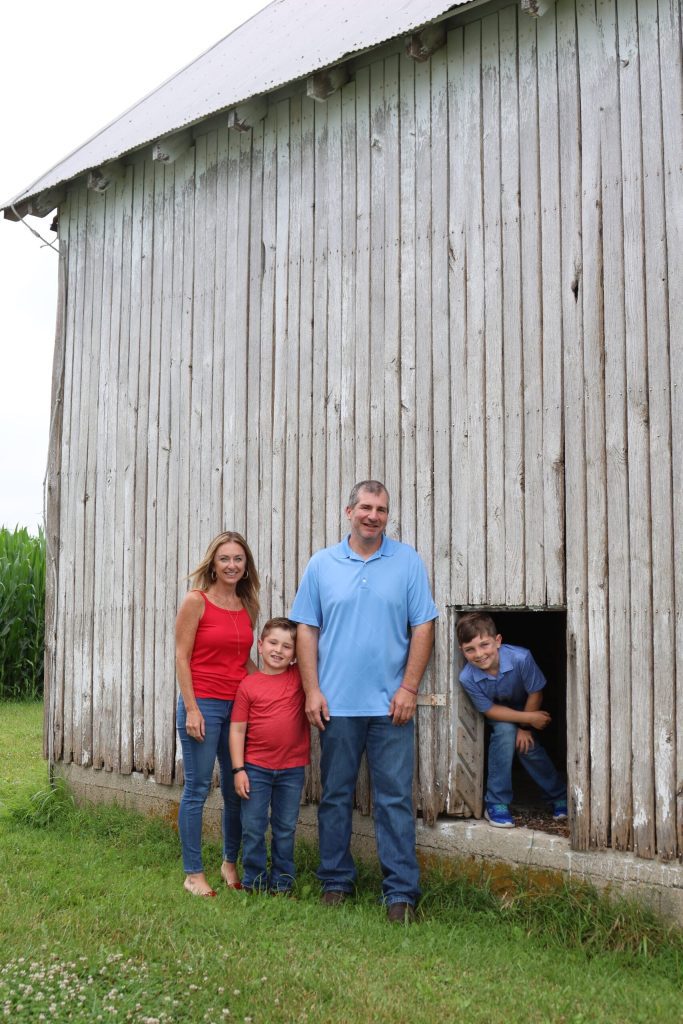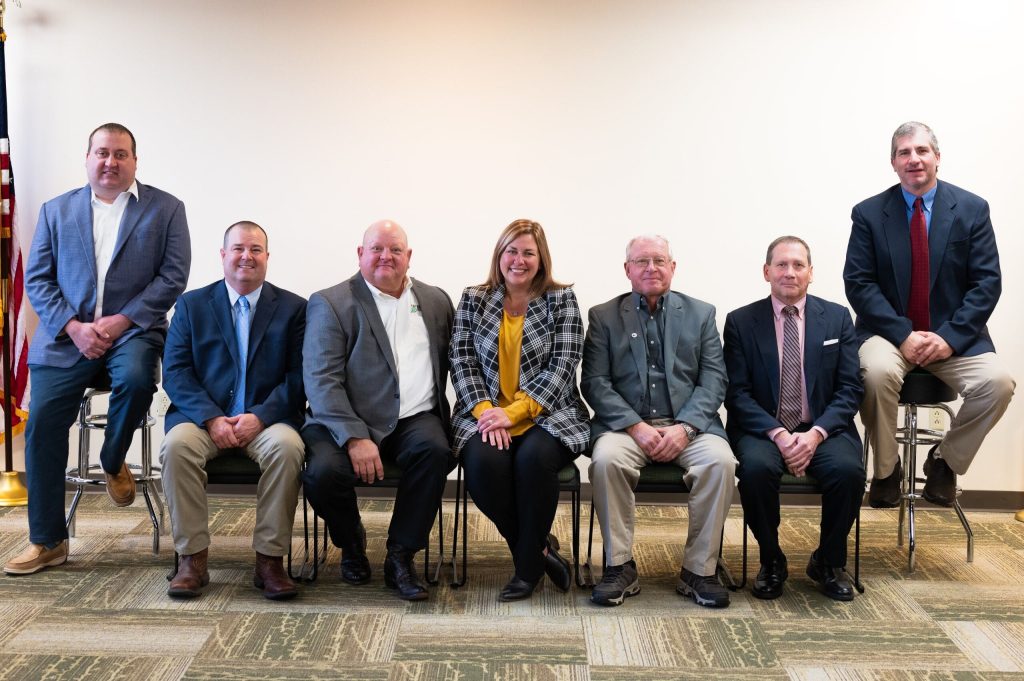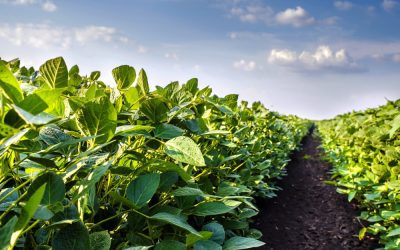More than a checkoff leader, Lemenager finds fulfillment as a father and a farmer
By Dave Blower Jr.

Some people find fulfillment and identity in their careers. Others are motivated by money to work harder. For Keevin Lemenager, he values providing for his wife, April, and their two sons Baylor, 7, and Brigham, 9. On their Morgan County farm near Monrovia, Ind., the Lemenagers spend their days working on the farm, taking care of responsibilities and enjoying family time.
Lemenager will complete his third three-year term as a member of the Indiana Soybean Alliance (ISA) Board of Directors later this year. He became a director representing District 4 on the ISA board in 2016. During his time serving the state’s checkoff program, he has also served on checkoff partner programs such as the Soy Aquaculture Alliance (SAA) and the USA Poultry and Egg Export Council (USAPEEC).
Lemenager has been a full-time farmer since 2000. He not only farms in Morgan County, Lemenager also grows corn and soybeans in both Putnam and Hendricks counties.
In addition, Lemenager has found value in advocating for farmers at the state and federal level. In 2023, he served as the chair of ISA’s Membership and Policy Committee (M&P) and campaigned for many ag policies in the Indiana legislature. This year he serves as Secretary for ISA and as a Hoosier delegate for the American Soybean Association (ASA) advocating for federal policies such as a new farm bill.
Agriculture has always been a part of Lemenager’s life. His father, Ron Lemenager, is currently a professor of animal sciences at Purdue University. His mother, Glenda, worked as a medical laboratory technologist in clinical pathology at Purdue Veterinary Medicine. He also raises cattle with his father in Benton County, Ind., along with his mother, his brother, Brian, and sister-in-law, Stepheny.
Education is important in the Lemenager household. He earned a degree from Purdue University, and he participated in The Executive Program for Agricultural Producers at Texas A&M University.
A good blind date
April Lemenager never imagined living on a farm or learning what she has in recent years.
“I had never met a farmer in my life,” April admitted. “We were set up through a series of friends but had difficulty actually meeting each other. It was late springtime, and he told me that it had been a wet spring. At the time I had no idea what that meant other than that it prevented us from meeting up in person. So, we spent the next three weeks getting to know each other over the phone. If I remember correctly, it was row 17 that kept giving him trouble during those late-night phone calls.” g
Eventually planting season wrapped up, and they had their first date – not without drama.
“Coming out of the restaurant on our first date, I noticed I had a flat tire,” she said. “(Keevin) had driven a service truck straight from the field to the restaurant and fixed it right there.”
Lemenager, smiling, said, “I got that tire fixed for her, and the rest is history.”
April admitted that her understanding of agriculture and farmers was far from complete while growing up in Hendricks County. She realized that farming is incredibly complex and very much a business.
“I was unaware of how much technology is involved in the entire process,” she said. “The equipment that he operates has so many different screens tracking and monitoring everything that he needs to know to help him do the best job.”
Like Lemenager, April finds joy in raising their boys. “Most of the time she’s an unpaid Uber driver for two broke little boys,” he joked.
On occasion, Lemenager will have one son with him running the combine, and April will operate the grain cart with the other son. “The boys like riding in the tractors, and they like talking on the radios. It’s good family time,” he said smiling.
Raising responsible boys
April had a career before meeting Lemenager. “I was a mental health therapist,” she said.
“Now I am her full-time patient,” Lemenager quipped.

These days April is a full-time mom.
“The farm has been fortunate, and we’re at a size where it can support us,” Lemenager said. “Once we started to have children, April was able, and wanted, to take a break from mental health work in order to stay home to raise the boys.”
Although work in agriculture has always been a part of his life, Lemenager wants Brigham and Baylor to find their own passions whether it be in agriculture or not. “You know, they are 7 and 9, and at that age they’re interested in a lot of things,” he said. “They show an interest in what I do. Brigham likes to shell corn, and they like to visit the cattle on my dad’s farm. But what’s in their future? I don’t know. I just want them to be happy and choose something they’re going to like to do.”
In the small plot of land around their home is a garden, a playground, a corn crib and an old barn. These are picturesque places familiar to the Lemenagers’ sons. “I think a farm is just a great place to raise kids,” he said.
April said Lemenager is a devoted father. “There is not much that chokes this man up, but those two little boys can do that,” she said. “He cares for them and their future deeply.
“Keevin is certainly a provider, for sure, but it’s more than that. Simply put, he is just a genuinely good person. He teaches the boys about responsibility; he’s really good about that. He talks to them about giving back, taking care of the ground, caring for animals and simply doing the right thing even when it’s hard. For their age, I think the boys have a good understanding of responsibility and business.”
Lemenager said he’s glad Brigham and Baylor have a close relationship with his parents, and he’s glad they like to visit the cattle on their farm. “They probably go to Benton County and see the cattle a few more times a year than I do,” he said. “I’m glad they enjoy that, and they learn quite a lot being around the cattle.”
Checkoff and the farm
Growing up, Lemenager understood cattle and growing hay. In the past 24 years, he’s devoted his time to becoming a better row-crop farmer. Part of his success is finding the right crop to grow. He prefers specialty crops that offer a premium. All of his soybean acres are planted with high oleic soybeans. Lemenager delivers his harvested soybeans to ADM in Frankfort, Ind.
ISA, the state’s soybean checkoff program, has worked to develop a market for high oleic soybean oil so that Hoosier farmers can earn a premium on a better crop. As a result, Indiana is the largest producer of high oleic soybeans in the world, and it’s where Lemenager learned about the crop.

Likewise, he grows non-GMO waxy corn in his corn fields. “We’re in the specialty market both ways,” Lemenager said.
In addition, he believes in responsibly growing his crop. “I’m proud of what we do, and I think we try to do it right,” Lemenager said. “Every field we own is pattern tiled, and that creates a better environment to grow a crop. It’s also better for the environment because of water management. You’re creating a sponge out of your soil, and there’s less runoff downstream.
He said improving soil quality is key to a successful crop. When he acquires new ground, Lemenager takes steps to make it more productive. Those steps include installing new drainage tile and soil testing to create maps for variable rate seeding and fertilizer. He said he prefers poultry manure as a fertilizer, in part, because Indiana poultry farms consume a large percentage of the state’s corn and soybean crop.
While the checkoff has helped his farm by offering information on different crops and growing techniques, he said ISA’s efforts to find new markets is just as important.
During his time on the ISA board, Lemenager learned that soybean meal can be a high-quality protein source for aquaculture diets. Also, with his work on USAPEEC, he has seen buyers in the growing economies of smaller countries express a desire for more protein through U.S. exports of chicken, turkey and duck – all of which contain a lot of soybeans in their diet.
“I really believe in the checkoff work that we’re doing,” Lemenager said. “I didn’t know much about the checkoff when I became a director on the board. However, the more involved I’ve become, the more I believe we’re helping every soybean grower in the State of Indiana.”
Posted: July 20, 2024
Category: Indiana Corn and Soybean Post - July 2024, ISA, News




